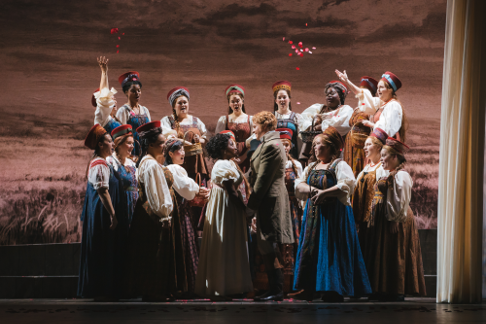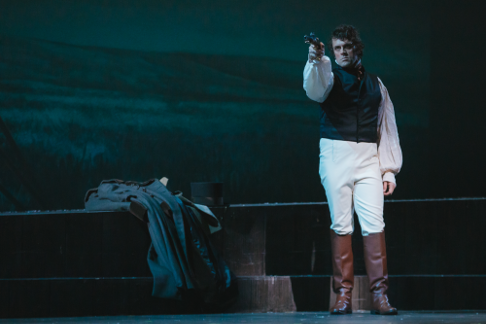![Marjukka Tepponen (Tatyana) and John Moore (Eugene Onegin) [Photo by Sunny Martini]](http://www.operatoday.com/20200108_eugeneonegin-day01_seattleopera_sunnymartini_38202.png)
19 Jan 2020
Eugene Onegin at Seattle
Passion! Pain! Poetry! (but hold the irony . . .)
English Touring Opera are delighted to announce a season of lyric monodramas to tour nationally from October to December. The season features music for solo singer and piano by Argento, Britten, Tippett and Shostakovich with a bold and inventive approach to making opera during social distancing.
This tenth of ten Live from London concerts was in fact a recorded live performance from California. It was no less enjoyable for that, and it was also uplifting to learn that this wasn’t in fact the ‘last’ LfL event that we will be able to enjoy, courtesy of VOCES8 and their fellow vocal ensembles (more below …).
Ever since Wigmore Hall announced their superb series of autumn concerts, all streamed live and available free of charge, I’d been looking forward to this song recital by Ian Bostridge and Imogen Cooper.
Although Stile Antico’s programme article for their Live from London recital introduced their selection from the many treasures of the English Renaissance in the context of the theological debates and upheavals of the Tudor and Elizabethan years, their performance was more evocative of private chamber music than of public liturgy.
Evidently, face masks don’t stifle appreciative “Bravo!”s. And, reducing audience numbers doesn’t lower the volume of such acclamations. For, the audience at Wigmore Hall gave soprano Elizabeth Llewellyn and pianist Simon Lepper a greatly deserved warm reception and hearty response following this lunchtime recital of late-Romantic song.
For this week’s Live from London vocal recital we moved from the home of VOCES8, St Anne and St Agnes in the City of London, to Kings Place, where The Sixteen - who have been associate artists at the venue for some time - presented a programme of music and words bound together by the theme of ‘reflection’.
'Such is your divine Disposation that both you excellently understand, and royally entertaine the Exercise of Musicke.’
‘And there was war in heaven: Michael and his angels fought against the dragon; and the dragon fought and his angels, And prevailed not; neither was their place found any more in heaven … that old serpent … Satan, which deceiveth the whole world: he was cast out into the earth, and his angels were cast out with him.’
There was never any doubt that the fifth of the twelve Met Stars Live in Concert broadcasts was going to be a palpably intense and vivid event, as well as a musically stunning and theatrically enervating experience.
‘Love’ was the theme for this Live from London performance by Apollo5. Given the complexity and diversity of that human emotion, and Apollo5’s reputation for versatility and diverse repertoire, ranging from Renaissance choral music to jazz, from contemporary classical works to popular song, it was no surprise that their programme spanned 500 years and several musical styles.
The Academy of St Martin in the Fields have titled their autumn series of eight concerts - which are taking place at 5pm and 7.30pm on two Saturdays each month at their home venue in Trafalgar Square, and being filmed for streaming the following Thursday - ‘re:connect’.
The London Symphony Orchestra opened their Autumn 2020 season with a homage to Oliver Knussen, who died at the age of 66 in July 2018. The programme traced a national musical lineage through the twentieth century, from Britten to Knussen, on to Mark-Anthony Turnage, and entwining the LSO and Rattle too.
With the Live from London digital vocal festival entering the second half of the series, the festival’s host, VOCES8, returned to their home at St Annes and St Agnes in the City of London to present a sequence of ‘Choral Dances’ - vocal music inspired by dance, embracing diverse genres from the Renaissance madrigal to swing jazz.
Just a few unison string wriggles from the opening of Mozart’s overture to Le nozze di Figaro are enough to make any opera-lover perch on the edge of their seat, in excited anticipation of the drama in music to come, so there could be no other curtain-raiser for this Gala Concert at the Royal Opera House, the latest instalment from ‘their House’ to ‘our houses’.
"Before the ending of the day, creator of all things, we pray that, with your accustomed mercy, you may watch over us."
The doors at The Metropolitan Opera will not open to live audiences until 2021 at the earliest, and the likelihood of normal operatic life resuming in cities around the world looks but a distant dream at present. But, while we may not be invited from our homes into the opera house for some time yet, with its free daily screenings of past productions and its pay-per-view Met Stars Live in Concert series, the Met continues to bring opera into our homes.
Music-making at this year’s Grange Festival Opera may have fallen silent in June and July, but the country house and extensive grounds of The Grange provided an ideal setting for a weekend of twelve specially conceived ‘promenade’ performances encompassing music and dance.
There’s a “slide of harmony” and “all the bones leave your body at that moment and you collapse to the floor, it’s so extraordinary.”
“Music for a while, shall all your cares beguile.”
The hum of bees rising from myriad scented blooms; gentle strains of birdsong; the cheerful chatter of picnickers beside a still lake; decorous thwacks of leather on willow; song and music floating through the warm evening air.
![Marjukka Tepponen (Tatyana) and John Moore (Eugene Onegin) [Photo by Sunny Martini]](http://www.operatoday.com/20200108_eugeneonegin-day01_seattleopera_sunnymartini_38202.png)
Passion! Pain! Poetry! (but hold the irony . . .)
I took a long time for me to warm up to Eugene Onegin. It lacks the soaring, aching Tchaikovskian melodies that once heard, stick in memory ever after. Apart from a few passages – the letter scene in the first act, the lover’s dawn lament in the second, the feverish duet that ends the third – the vocal lines are conversational, accompanied by small motifs seemingly meaningless as smoke rings curling in the air. But with familiarity these tunelets merge and intertwine to create a hazy atmosphere of gentle melancholy that perfectly reflects a story line focused on loss, the past, the sweet pain of regret.
That truly nostalgic mood is wonderfully supported by director Tomer Zvulun’s “concept” for the staging, and Erhard Rom’s simple but versatile settings to contain it: slender beech trees against fields of grain, a gloomy winter dawn, ballrooms both provincial and majestic, which a shift of light can freeze a mundane scene into an evocative image, a postcard from the past.
 Seattle Opera Chorus, Melody Wilson (Olga) and Colin Ainsworth (Lensky)
Seattle Opera Chorus, Melody Wilson (Olga) and Colin Ainsworth (Lensky)
Vocally the principal singers in the two casts necessitated by Seattle’s compressed two-week eight-performance are uniformly excellent: Marjukka Tepponen highlights Tatyana’s timidity and woolgathering but rises to anguished dignity in the big duet. Marina Costa-Jackson makes her more impulsive, even a little feisty. Both approaches mesh with their respective Onegins’: John Moore bravely shows us the priggish, mannered side of Evgenyi; Michael Adams goes for the smoldering mystery that captivates his unintended victim.
Tchaikovsky’s amateur libretto gives Onegin little chance to shine until the very end of the opera. In this staging as in many others, it’s Colin Ainsworth as that innocent sap Lensky who scores our sighs and applause for his dawn monologue on the brink of extinction. Melody Wilson’s youthful voice is a little undeveloped for the near-contralto tessitura of Tatyana’s teen-aged sister Olga; I look forward to hearing her in a solidly mezzo role.
The Seattle Opera chorus – whether playing happy serfs, smug provincial dignitaries or lofty aristocrats at the Imperial court – sing, act, and move so well that the numerous dance numbers staged by Logan Pachciarz are among the greatest pleasures of the staging.
I think one opportunity is missed in this production: the chance to provide a dimension of the Aleksandr Pushkin’s original poem that is completely absent from the libretto. Tchaikovsky’s personality was complex and ambiguous but one thing he lacked utterly: a sense of irony. For him, life is no laughing matter: one loves, one loses, one suffers, and only death awaits us.
Pushkin doesn’t disagree; but his reaction to our predicament is to smile, even laugh outright, at the absurd ways we try to deal with it, and there are many moments in the action of the opera, even as simplified and sentimentalized by the composer, where such ironies lie temptingly near the surface. Director Zvulun chooses to let them pass, even when audible chuckles show that the audience gets the joke even if he doesn’t.
Still, the drama achieves tragicomic grandeur thanks to conductor Aleksandar Markovič. Taking his time setting the scene of seemingly placid country life, he minutely paces the soprano through the many musical beats of the her exalted “letter scene” to a beautiful climax. From that point onward, every scene, crowded or intimate, festive or solitary, moves the story relentlessly forward.
 John Moore (Eugene Onegin)
John Moore (Eugene Onegin)
(Speaking of moving forward: Is anybody else as irritated by M. Triquet as I? His wan little couplets stop the action dead at the birthday ball in act II, just when we should be concentrating on Onegin’s fake flirtation with Olga.)
The musicians of the Seattle Symphony have long been a mighty asset in the pit at McCaw Hall; this time, under Markovič’s shaping hand, they excelled themselves, particularly the solo winds so important to Tchaikovsky’s sound palette. This is Maestro Markovič’s US debut. I hope the Opera’s general director Christa Scheppelmann nails him down for future projects before word gets out.
Roger Downey
Pyotr Ilyich Tchaikovsky: Eugene Onegin
Tatyana – Marjukka Tepponen (11th January)/Marina Costa-Jackson (12th Jan.), Onegin – John Moore (11 th Jan.)/Michael Adams (12th Jan) Lenski – Colin Ainsworth, Olga – Melody Wilson, Prince Gremin – David Leigh, Larina – Margaret Gawrysiak, Filipevna – Meredith Arwady, M. Triquet – Martin Bakari, Zaretzki – Misha Mizikoe; Director – Tomer Zvulun, revival director – Stephanie Havey; Conductor – Aleksanr Markovič; Scenic designer – Erhard Rom; Lighting designer – Robert Wierzel; Costume designer – Isabella Bywater; Choreographer- Logan Pachciarz; Seattle Opera Chorus (Chorus master John Keene); Members of the Seattle Symphony Orchestra. Marion McCaw Hall at Seattle Center, Seattle Washington; 11th and 12th January 2020.